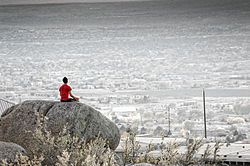Yogashikha Upanishad
| Yogashikha | |
|---|---|

Yoga is the highest of knowledge states the text
|
|
| Devanagari | योगशिखा |
| IAST | Yogaśikhā |
| Title means | Peak of Yogic meditation |
| Type | Yoga |
| Linked Veda | Krishna Yajurveda or Atharvaveda |
| Chapters | varies by manuscript (1 to 6) |
| Verses | varies by manuscript (~10 to 390) |
| Philosophy | Yoga, Vedanta |
The Yogashikha Upanishad (Sanskrit: योगशिखा उपनिषत्, IAST: Yogaśikhā Upaniṣad) is a Sanskrit text and one of the minor Upanishads of Hinduism. It is one of twenty Yoga Upanishads in the four Vedas.
Two versions of the Yogashikha Upanishad exist, one short that is attached to the Atharvaveda in some anthologies, and a long version which is often found attached to the Krishna Yajurveda in Telugu language anthologies. The long version consists of six chapters, and is about forty times longer than the short version. The short version appears interspersed within the first chapter of the long version.
The Yogashikha is an ancient text, states Mircea Eliade, who suggests a relative chronology. He dates it to the same period when the following Hindu texts were composed – Maitri Upanishad, the didactic parts of the Mahabharata, the chief Sannyasa Upanishads and along with other early Yoga Upanishads such as Brahmabindu, Brahmavidya, Tejobindu, Yogatattva, Nadabindu, Kshurika, Dhyanabindu and Amritabindu. These texts along with the Yogashikha Upanishad, adds Eliade, were composed earlier than the ten or eleven later yogic Upanishads such as the Yoga-kundali, Varaha and Pashupatabrahma Upanishads.Gavin Flood dates this text, along with other Yoga Upanishads, to be probably from the 100 BCE to 300 CE period.
The Unpracticed one will be pulled out of meditation by the senses, even if he forcefully tries to control them.
Georg Feuerstein calls the Yogashikha Upanishad, as the "Crest of Yoga" and the "most comprehensive of the Yoga Upanishads". The ideas found in Yogashikha are shared in many Hatha Yoga texts such as those by Gorakhnath.
...
Wikipedia
